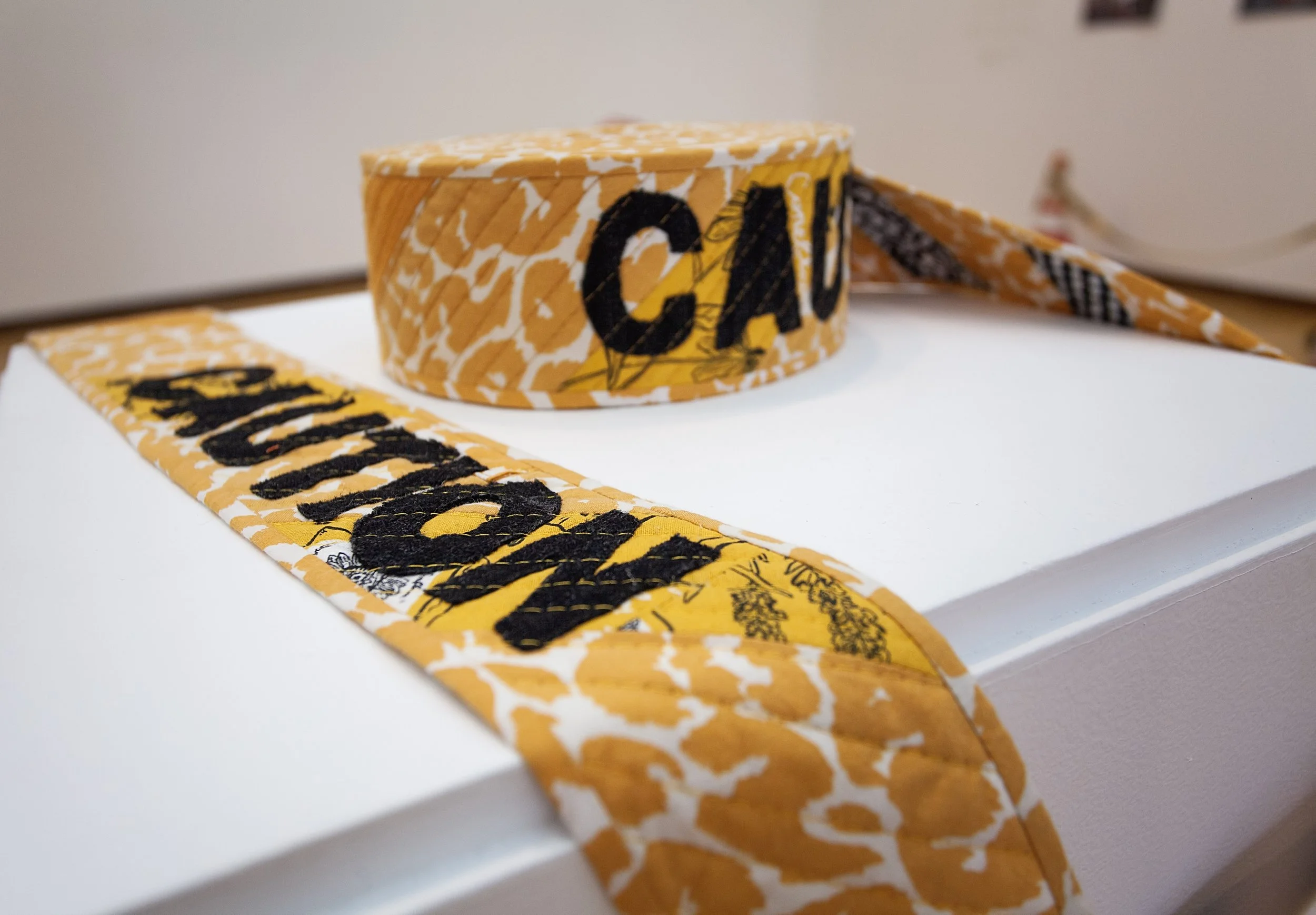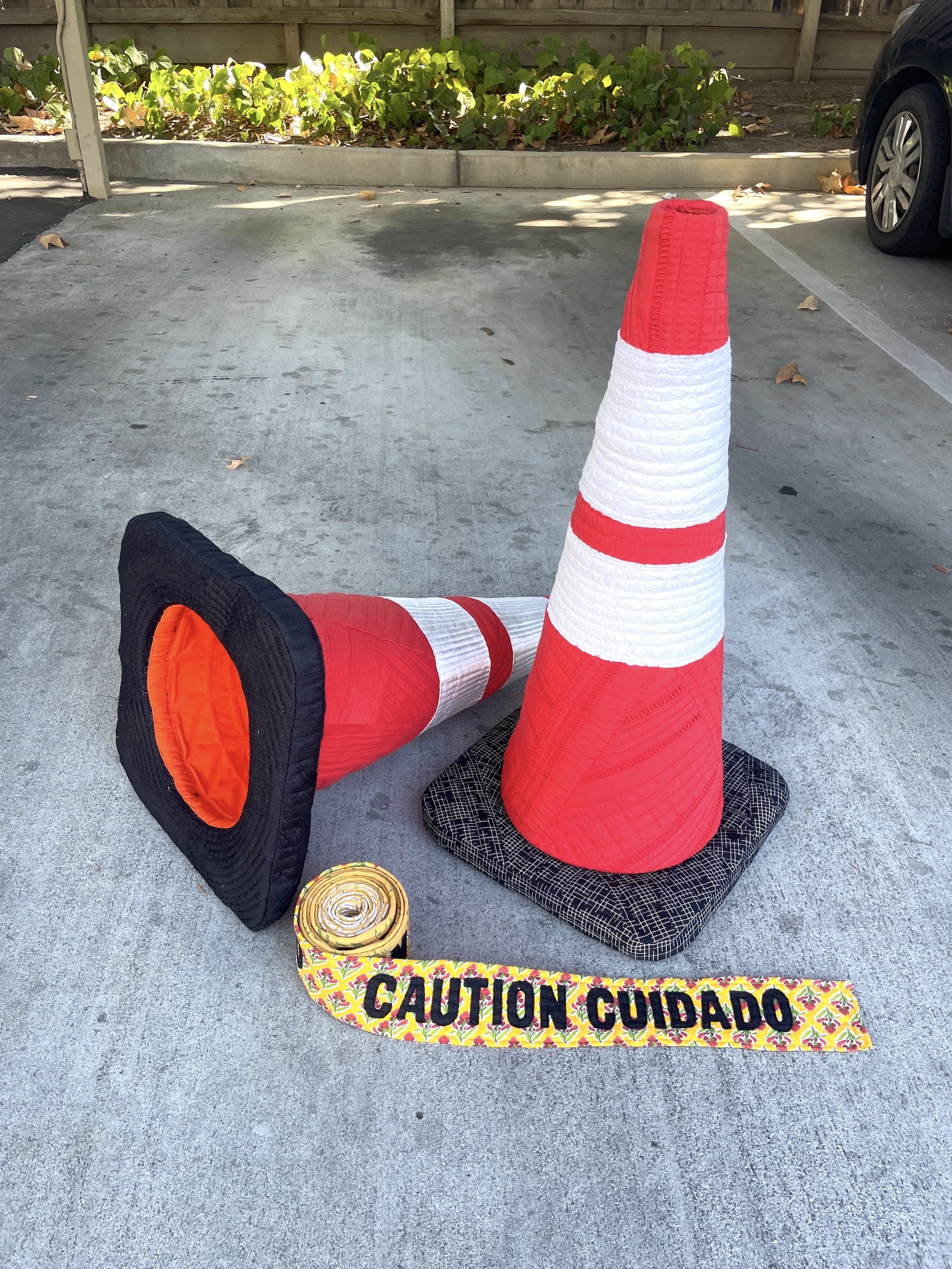Redirections
Installation view of Redirections at Jewett Art Gallery featuring artwork by Isabella King ’18, Kelsey Reiman ’15, Isaac Zerkle ‘18
Exhibition Information
On View: March 4 – April 5, 2024
Gallery Hours: 10:00 am – 5:00 pm.
Closing Reception: April 5, 2024 @5:00pm
Location: Jewett Art Gallery, Wellesley College, 106 Central Street, Wellesley, MA 02481
Press Release
Redirections is an exhibition of new work by Isabella King ’18, Kelsey Reiman ’15, and Isaac Zerkle ‘18. King, Reiman, and Zerkle are three of the recipients of the 2022-23 Alice C. Cole ’42 Studio Project Grant. The other two recipients of the 2022-23 grant, Breslin Bell ’18 and Juyon Lee ’18, exhibited together earlier this academic year.
The Alice C. Cole '42 Studio Project Grant provides project-based support to recent Wellesley College graduates for the development, production, and exhibition of new work in painting and sculpture, whatever those disciplines may mean to the artist. The fund enables promising recent graduates to set aside time for artistic development as well as to purchase materials, rent studio space, or access facilities for the creation of new projects.
Isabella King is a San Francisco Bay Area-based textile artist and painter. Originally from Cincinnati, Ohio, she graduated from Wellesley in 2018 and currently works as a philanthropy professional for Bay Area arts nonprofits. Take Caution is an intricately crafted soft sculpture and art quilting installation that explores the nuanced intersectionality of gendered creative labor, space, and ownership. Reclaimed textiles, sourced from discarded women’s clothing, home décor, and fabric remnants, are transformed into utilitarian objects that control spatial movement, signify ownership, and symbolize labor. Traditionally associated with masculine and visibly impactful work, these objects denote sites where humans alter the landscape. By using soft forms and traditionally feminine-coded artmaking techniques like quilting, sewing, and embroidery, and by including evidence of the original garments from which the material to make these pieces was derived, King asks the viewer to consider the labor already invested in these objects by global garment workers, the majority of whom are women.
When installed in the ‘real world,’ the fabric cones and quilted caution tape often go unnoticed—rather, they are seen the way that actual traffic cones and caution tape are seen and are instinctively obeyed as such, but their status as hand-made artworks often remains undetected. The labor-intensive processes and meticulous care invested in them are rendered invisible. Reduced to symbols, these art objects sit at the cusp between hyper-visible and invisible, paralleling the invisible nature of clothing manufacturing work performed globally and much of women’s work throughout history, both within and beyond the art world.
Kelsey Reiman is a Nevada-based artist. Originally from Kearney, Nebraska, she graduated from Wellesley in 2015, earned her MFA from Arizona State University, and is currently the interim director of Black Rock Press at the University of Nevada, Reno. She works primarily in printmaking and book arts, creating book structures that follow the constraints of the machinery and tools used in print and book-making processes as well as mathematical and geometric rules of her own. Book structures are carefully planned and engineered, while color is approached more intuitively, allowing shifts due to light and material to dictate their own outcomes. The sets of rules used to create the artist book Gleam, Glisten, Glimmer, Glitter, Gloom, Glare, Glint, Glow raise questions about which rules are real and which are arbitrary. Some rules ensure success while others are detrimental to growth, control, and completion.
Snap to Grid, an artist book and animation, uses systems both rational and arbitrary to examine the relationship between digital and analog processes, analytical versus playful modes of making, and the partnership and tension between decorative and functional aesthetics. When closed, the book takes the form of a gradually rotating stack of squares, determined by a mathematical formula; when open, the book reveals a long structure that is a linear representation of the accompanying animation, which may be viewed via the QR code displayed with the piece. The animation was made in response to a musical composition written by Christopher Pierce, who composed the music in response to the book structure. While the title of this piece refers to a fantasy of complete control and adherence to a system, the book and animation reveal the impossibility of humans acting as infallible machines.
Isaac Zerkle is a Boston-based artist. Originally from Charlotte, North Carolina, they graduated from Wellesley in 2018, earned an MFA from the School of the Museum of Fine Arts, Boston, and currently work as a professional art handler. Their practice incorporates printmaking, photography, and installation, using archival material to generate and transform personal and cultural narratives in relationship to specific landscapes and sites of engagement with the natural world. Their recent projects are inspired by a small collection of Baltic amber passed down from their Mormor’s father, who gathered them from the coast near his home in Denmark. Baltic amber is the fossilized resin of ancient trees, around 35-55 million years old. Originally produced as a healing response to injury or disease, amber functions as a time capsule into the distant past and preserves fragments of life for the future. On recent trips to Denmark, Zerkle collected their own amber, met extended family for the first time, and traveled to their Mormor’s birthplace. The installation in this show combines ephemera from these trips with archival materials, creating a ritualized space that reflects both solid amber and the flowing resin that was its original state. The work asks viewers to consider questions about what they carry from the past, what is left behind, what is preserved for the future, and how they shape the transformation of experience into memory.
This exhibition will be on view in the Jewett Art Gallery from March 4 – April 5, 2024. The Gallery, located on the main floor of the Jewett Arts Center at Wellesley College, is open to the public 10:00 am – 5:00 pm, 7 days a week for the duration of the show. The Gallery is free to visit. Visitor parking is available at the Davis Parking Facility on Wellesley’s campus; see the Visitor Parking tab at the following website for more information: https://www.wellesley.edu/police/services/parking
To arrange a guided tour of the exhibition, or for more information, contact Gallery Director Samara Pearlstein at 781-283-2043 or spearls2@wellesley.edu.
Isabella King https://isabellaking.art/
Kelsey Reiman http://www.kelseyreiman.com/
Isaac Zerkle https://isaaczerkle.com/home.html



